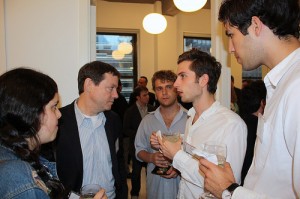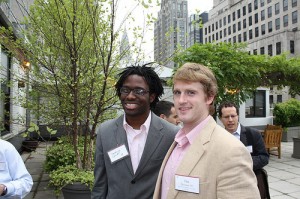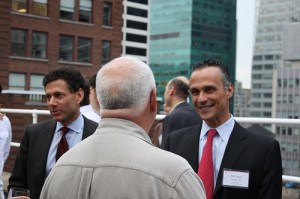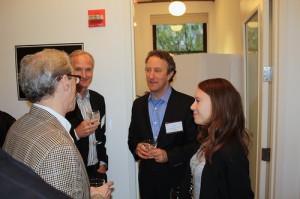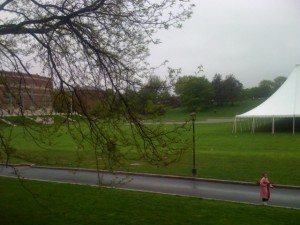Yesterday I met with the Cabinet for a day-long retreat to discuss our goals for the year in the context of our strategic plan and the current state of the university within the wider culture and society. Our “retreat” wasn’t one of those junkets for bureaucrats at a fancy facility. We just met for the day in a different part of the campus than where we usually gather. And we didn’t deliver mini-lectures to one another on what we expected to achieve each semester. Instead, we held some group and individual exercises (“Imagine that your group has to tweet a billionaire to describe why he/she should support the university”) that spurred us to articulate our priorities and sense of mission.
I was interested to hear my colleagues discuss what they thought was distinctive about the Wesleyan experience, and how we could best support that. Words like “diversity,” “civic engagement,” and “creativity” came up often, and so did “boldness,” “scholar-teacher model,” and the idea that we must always make it possible for talented students to attend the university through a robust financial aid program. In the end, we were talking about how Wesleyan can become an even stronger supporter of a pragmatic liberal arts education that fosters creative and critical thinking and builds on the talent, independence of mind and generosity of spirit of our community.
This morning I spoke with the staff at our kick-off the semester event. Employees from all departments greeted old friends and met new ones. I met Ralph Connolly, who has been working in physical plant at Wes since 1979 (I just missed him when I was here as a student), and he told me about the variety of jobs and training he’s had on campus. In my remarks to the group, I emphasized the difficulties of navigating through this very challenging economic environment. But I also stressed that we are finding ways to invest in our people — not just in the endowment.
I frequently use trustee Geoff Duyk’s memorable phrase “intellectual cross-training” to describe the educational experience at Wesleyan. Whatever we call it, I can hardly wait for it to begin anew when the semester gets underway!
Here’s an alphabetical update on who is in the Cabinet:
Secretary of the University and Special Assistant to the President for Board and Campus Relations: Marianne Calnen
Marianne has worked at Wesleyan since 1998 and has long been deeply involved with projects concerning the Board of Trustees. She also helps with internal communications and a range of campus issues that build community.
Vice President for Institutional Partnerships and Chief-Diversity-Officer: Sonia Manjon
Sonia is beginning her fourth year at Wesleyan. We worked together at the California College of the Arts in Oakland/San Francisco on programs that linked the school and the city. Sonia leads our efforts in affirmative action, and she partners with faculty, staff and off-campus organizations to promote civic engagement.
Vice President for Finance and Administration: John Meerts
John has been at Wesleyan for 15 years, and before becoming the Treasurer he was in charge of our technology needs (which he once again is doing on a temporary basis). Most of the administrative departments report to John, including Public Safety and Physical Plant.
Dean of Admission and Financial Aid: Nancy Meislahn
Nancy has been head of our Admissions and Financial Aid offices since 2000. Our selectivity and the application pool’s diversity have improved markedly in the last few years.
Vice President for Academic Affairs and Provost: Rob Rosenthal
Rob has been at Wesleyan since 1987. He is John E. Andrus Professor of Sociology and has been at the forefront of our service learning and community partnership work. Rob is the leader of our academic programs.
Director of Strategic Initiatives: Charles Salas
Charles came to Wesleyan three years ago from the Getty Research Institute, where he was Head of Research and Education. An intellectual historian of Modern Europe, Charles has helped plan programs like the College of the Environment and the Summer Session, and also is responsible for University Communications.
Chief-of-Staff: Andy Tanaka
Andy is a Wesleyan grad and former Freeman scholar. He works on almost everything that comes through the president’s office, from communications to physical plant, from student issues to alumni relations. When we need to get something done, Andy makes it happen.
Vice President for Student Affairs: Mike Whaley
Mike has spent 14 years at Wesleyan, always focused on the student experience. Mike is responsible for our co-curricular efforts and our residential life programs. From orientation to senior week, Dean Mike works on behalf of Wes students.
Vice President for University Relations: Barbara-Jan Wilson
Barbara-Jan may not have been born at Wesleyan, but she has certainly spent the bulk of her career here leading efforts in Career Planning, Admissions and now University Relations. Having spearheaded the most successful fundraising campaign in Wesleyan history, today she continues to work closely with alumni and staff to support all that we do at the university.
The Cabinet meets as a group each week, and Joan Adams, Executive Assistant to the President, always facilitates our efforts. I feel very fortunate to work with such dedicated and talented people.



